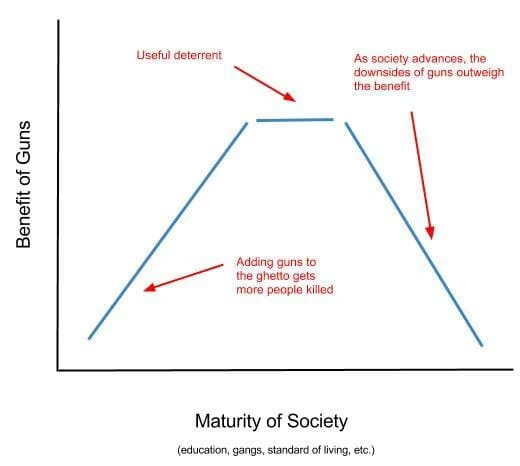A Simple Answer to the Question of Whether Guns Make Us More or Less Safe
[ Jul 17, 2013 ]
As expected, gun advocates believe guns make us more safe, and those against guns think they make us less so. Interestingly, both groups seem to have data to support their positions. I’ll say first of all that there isn’t an overwhelming amount of quality on the topic data because the NRA has lobbied against gun research >, but that’s a separate topic.
Even given our limited data set, however, it’s pretty easy to figure out why both cases may be true.
Guns are not universally good or bad

This is my chart based on a hypothesis–nothing more. But it highlights what I think should be the single defining question of the gun debate:
For any given subset of society, do guns present a positive or negative effect on overall wellbeing?
Going off of my chart above, I’d wager that for societies that are struggling, i.e. poor, uneducated, violent, emotional, etc.–adding guns is likely an idiotic way to improve the quality of life (see Detroit). As you move into middle maturity, however, they may present more benefit than harm by deterring crime and allowing crimes to be stopped more quickly by law-abiding citizens (Vermont?). Then, as you approach truly advanced society (with very little crime) it seems obvious that a large number of guns would become more of a liability than a benefit (Helsinki?).
It’s quite simply about how guns affect our desired outcomes.
And be smart about it; there are multiple variables at play. Gun laws, society, culture, populations, etc,–are all different in Helsinki than they are in Detroit. And both of those societies will like by different in 2100 than today. Stay focused on the question of harm vs. good, with solid metrics based on data (see NOT obstructed by lobbying organizations), and you will have something substantive to base decisions on.
So, liberals, if the data show that guns actually make a place safer, then opposing them because they "feel" emotionally wrong to you, and you reject them outright because of that, well…stop it. You’re part of the problem.
And conservatives, if the data show that guns make a place less safe, then promoting them because of tradition or because they make you feel good about "MERicuh", well…stop it. You’re part of the problem.
Simple guidelines
Decide as a society what "wellbeing" looks like, e.g.: overall crime, homicides, manslaughter, accidental harm, etc.
Do continuous study of how the variable of gun ownership, carry laws, etc. affect those metrics
Make policy based on the data
It’s stunning how many things this simple approach would benefit, and the gun debate is a flagship example.